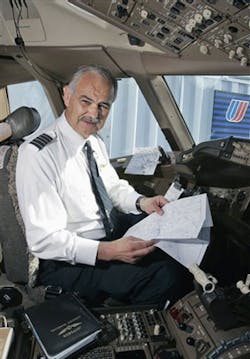Airline Pilots Lobby to Fly Past Age 60
Dozens of veteran airline pilots, some on the verge of forced retirement, urged lawmakers Tuesday to lift a federal rule that grounds them at age 60.
The Federal Aviation Administration now requires passenger and cargo pilots to quit flying at 60, with no exception for those in good health. That means an estimated 1,631 pilots for U.S. airlines will be forced to retire this year. By 2017, the tally will reach about 35,000.
On Tuesday, about 30 pilots launched a two-day lobbying blitz to let Congress know that they feel perfectly capable of staying on in the cockpit until they're 65.
"Safety is no longer an issue for discussion, as foreign airlines from all parts of the world have, for many years, demonstrated that they have been able to safely fly to age 65," said United Airlines pilot Allan Englehardt, 59.
For example, Englehardt said, Israeli airline El Al has allowed its pilots to fly until 65 for the past 15 years, and has had no accidents.
FAA spokesman Les Dorr has said there is "no compelling scientific or medical evidence that would cause us to reconsider the current age limit."
But Congress could require a change, he added, and the FAA would have to adhere to that.
Paul Emens, a Southwest Airlines pilot from Baltimore and founder of Airline Pilots Against Age Discrimination, said the United States could save about $1 billion a year if it allowed pilots to fly to age 65. Much of the savings, he said, would be due to the elimination of Social Security and pension-related benefits for five years per pilot.
The Senate Appropriations Committee in July approved a transportation appropriations bill that includes a provision that would let pilots fly to 65. It is pending before the full Senate, but is unlikely to pass before lawmakers leave for their October recess.
It's more likely that the issue will have to wait until a lame-duck session after the Nov. 7 elections. Its fate could depend on which party prevails.
Jay Keese, a lobbyist who discussed strategy with the pilots, said if the Democrats win control of Congress, the age issue probably will not come up until after the new Congress convenes in January.
"If the Republicans control a chamber, we're in pretty good shape," Keese said.
Time is running out for some pilots: Englehardt, a Lake Bluff, Ill., resident who has flown 37 years for United Airlines, ferrying hundreds of passengers at a time to such destinations as Honolulu and London, turns 60 on Jan. 29.
Also, because United Airlines terminated its pilots' pension plan in 2004, Englehardt won't get $142,000 in annual retirement income as he thought he would. Instead, he said, the government's Pension Benefit Guaranty Corp. will pay him $29,600 a year in retirement benefits.
Allowing pilots like Englehardt to fly an extra five years could bring them close to $800,000 to $1 million in additional income - and offset some of the loss in expected pension benefits.
Some members of Congress, along with the FAA and even the leadership of the Air Line Pilots Association International, argue that it is too risky to let older pilots keep flying because they might suddenly be struck by health problems.
"Medical science has not developed a regimen of reliable tests that can be administered effectively to determine which aging pilots will become incapacitated, or whose performance will decline to an unacceptable level," said Duane Woerth, president of the Air Line Pilots Association.
Under current international standards, foreign pilots older than 60 may fly into the United States as co-pilots. Effective Nov. 23, the International Civil Aviation Organization will raise the age limits for pilots, too.
That means foreign pilots will be able to fly in the United States up to age 65, so long as they're accompanied by a co-pilot under 60 and they undergo medical testing every six months.
"The issue was age discrimination, but now it has become discrimination against Americans," Englehardt said. "It's the rights of Americans who have served our country in the military and paid taxes for 40 years, versus the rights being given to foreign pilots who pay no taxes."
News stories provided by third parties are not edited by "Site Publication" staff. For suggestions and comments, please click the Contact link at the bottom of this page.

